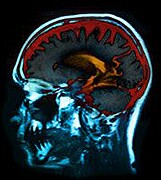- Could Artificial Sweeteners Be Aging the Brain Faster?
- Techniques for Soothing Your Nervous System
- Does the Water in Your House Smell Funny? Here’s Why
- Can a Daily Dose of Apple Cider Vinegar Actually Aid Weight Loss?
- 6 Health Beverages That Can Actually Spike Your Blood Sugar
- Treatment Options for Social Anxiety Disorder
- Understanding the Connection Between Anxiety and Depression
- How Daily Prunes Can Influence Cholesterol and Inflammation
- When to Take B12 for Better Absorption and Energy
- Epsom Salts: Health Benefits and Uses
Scientists Explore Morality’s Home in the Brain


Where does the human trait of morality reside in the brain? Researchers seeking to answer the question report that people with higher levels of moral reasoning have more gray matter in certain neurological areas.
The research, from the University of Pennsylvania’s Perelman School of Medicine, included 67 of the university’s MBA students who were given moral reasoning and personality tests. They also underwent MRI brain scans. The students were between the ages of 24 and 33, which meant that development of their brain structure was complete, according to the researchers.
Compared to participants with lower levels of moral reasoning, those with higher levels of moral reasoning had more gray matter in areas of the brain involved in complex social behavior, decision making and conflict processing, the researchers found.
What isn’t clear is whether higher levels of moral reasoning cause the development of more gray matter, or if people who have more gray matter are the ones more likely to have higher levels of moral reasoning.
The findings were published June 3 in the journal PLOS ONE.
“This research adds an investigation of individual differences in moral reasoning to the expanding landscape of moral neuroscience,” senior author Hengyi Rao, a Perelman research assistant professor of cognitive neuroimaging in neurology and psychiatry, said in a university news release.
But Rao stressed that further research is needed to determine whether brain differences “are the cause or the effect of higher levels of moral reasoning.”
More information
The Stanford Encyclopedia offers a definition of morality.
Source: HealthDay
Copyright © 2026 HealthDay. All rights reserved.










